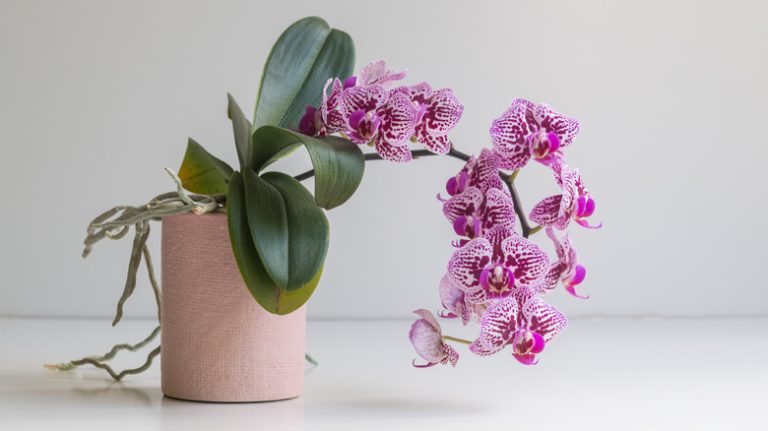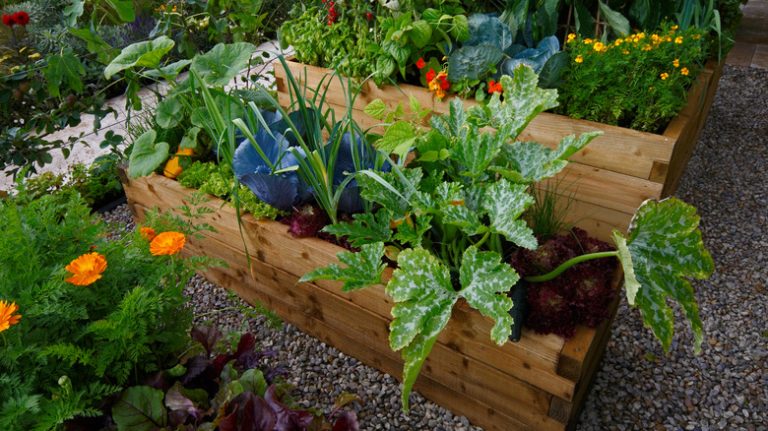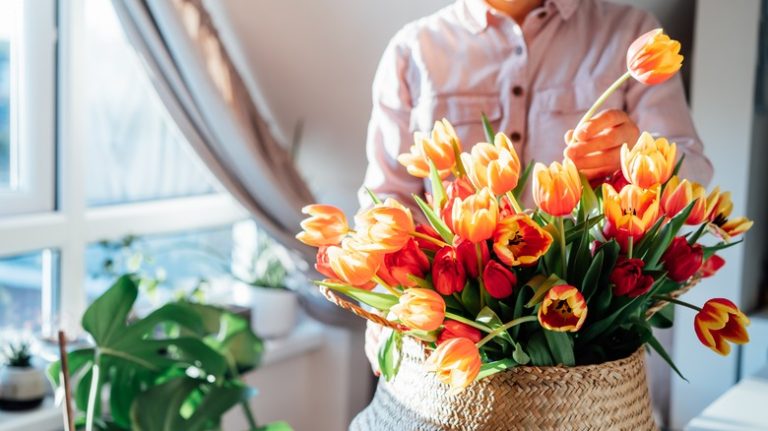When summer is in full swing, it’s time to start considering the plants you are sowing or bringing outdoors. One of the best ways to liven up your porch or patio is with flowers in hanging baskets, GardeningEtc notes. But, you don’t want to choose just any flowers. Wonderful smelling, fragrant varieties are the way to go. Then, when you or your guests walk up to your door, a pleasant smell meets the nose to welcome anyone in.
Flowers giving off a sweet musk aren’t necessarily hard to come by, but some perform better in hanging baskets than others. Knowing which blossoms will serve you all season long will help you keep your outdoor landscape looking great and smelling divine. If you’re lucky, they may also attract honey bees or hummingbirds, adding to their visual effect. No matter what your climate is like, there’s definitely a fragrant flower that could benefit from being planted at eye level to show off its beautiful blooms and distribute its delightful smell.
1. Viburnum
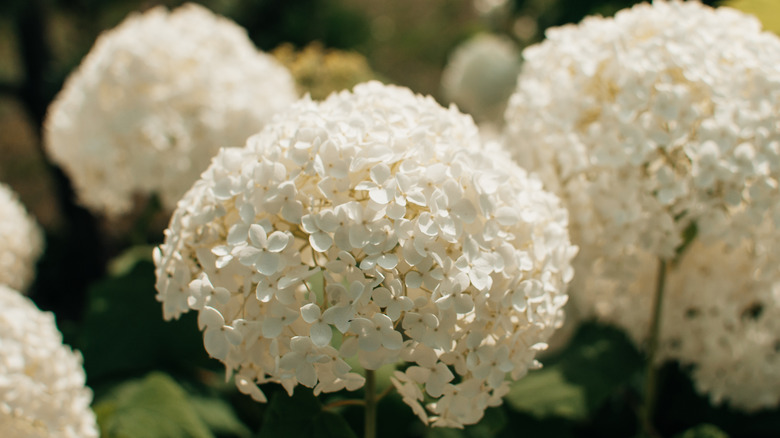
Not all viburnum are pleasantly scented as per Clemson Cooperative Extension. If you want to grow fragrant viburnum, be sure to pick up a cultivar like Spice Baby or Korean Spice, according to Balcony Garden Web. These plants bloom in the spring in USDA zones 2 through 9, depending on the variety. They need several hours of sunlight per day and rich, moist soil to grow properly. Make sure to water it about twice per week. When cared for properly, your viburnum plant may grow quickly. For hanging baskets, you should choose a smaller variety like Compactum or Bullatum.
2. Pelargonium
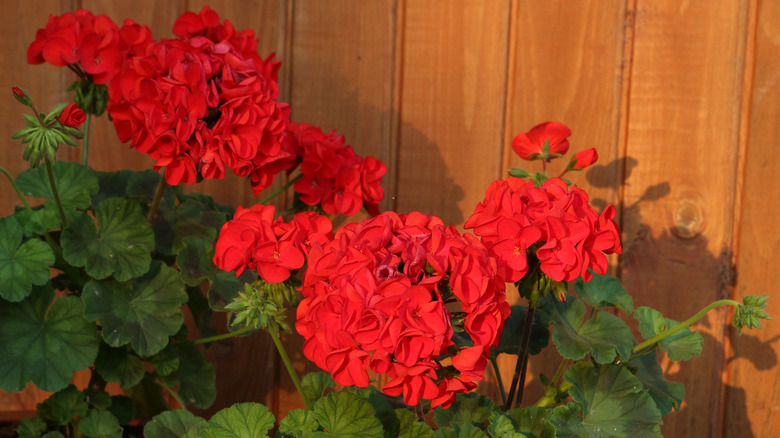
Pelargoniums, sometimes referred to as tender geraniums are beautiful drought-tolerant plants with fragrant leaves, making them wonderful for use in hanging baskets, as told by RHS. These easy-to-care-for plants bloom in the summer with white, red, or pink-colored flowers. They can be grown in arid USDA zones 10 and 11 when you provide them with full sun, well-draining soil-based compost, and restrained watering throughout the spring and summer. In maturity, your pelargoniums will become about 1 to 3 feet high, depending on the cultivar.
3. Gardenia
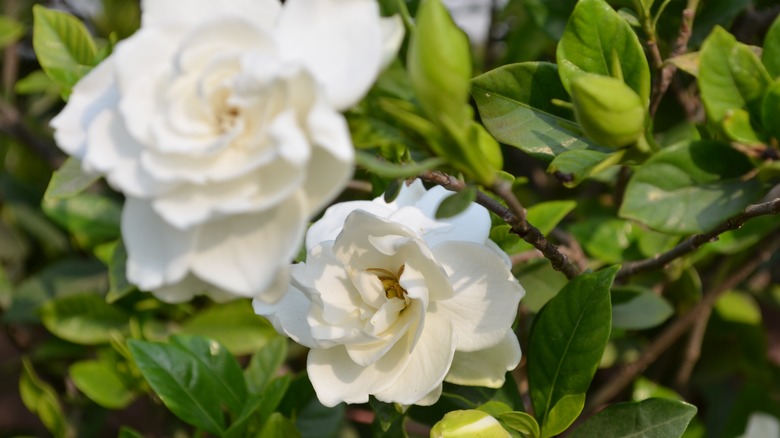
Bhupinder Bagga/Shutterstock
Everything about gardenias is attractive. From their gorgeous blossoms to their delightful scent, it’s no wonder these plants are so popular. Gardenia plants are a great option for hanging baskets as they only need partial sun and an inch of water per week. For the most beautiful flowers, you should plant yours in acidic, well-draining soil in USDA zones 6 through 11, says Gardenia. The plant can grow to become as large as 6 feet, but when planted in a container, they tend to stay much smaller.
4. Begonia
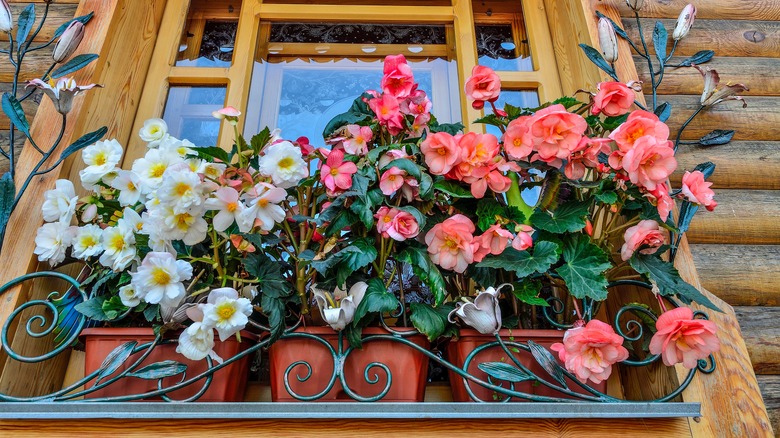
Olga Vasilek/Shutterstock
Begonia is well known for its unique scent that can differ from variety to variety. The sweet-smelling flowers bloom in the summer as long as you can provide the plant with good care. As explained by Clemson Cooperative Extension, begonia plants love partial shade, well-draining soil, and moist conditions through regular watering. When growing them outdoors in hanging baskets, make sure that temperatures stay warm as these plants prefer USDA zones 7 or higher. Keep in mind that begonias can grow up to 2 feet tall, so they may need some pruning throughout their growing season.
5. Honeysuckle
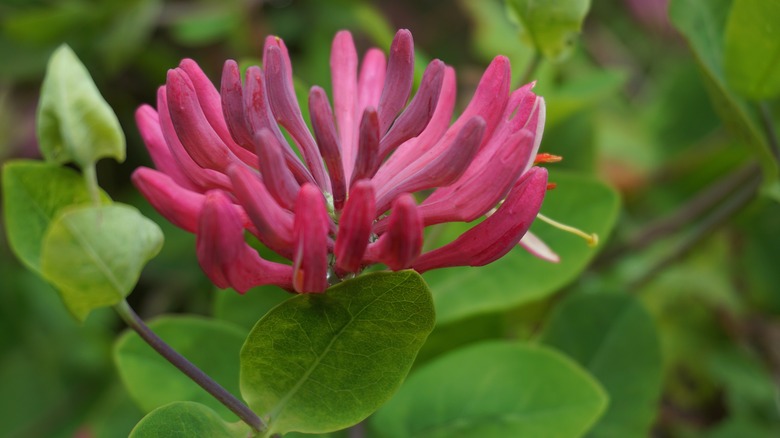
lenic/Shutterstock
Honeysuckle, in the genus Lonicera, are deliciously scented flowers that bloom in the summer and fall, as per Horticulture. They should be grown in full sun, where their scent will become more intense, and they should be watered regularly during every season except winter. Honeysuckle plants grow best in USDA zones 4 through 9 in rich, free-draining soil. This will ensure that they will grow strong and healthy throughout their flowering season. With proper care, these plants will slowly become a few feet tall and wide, which means you will need to cut them back.
6. Jasmine
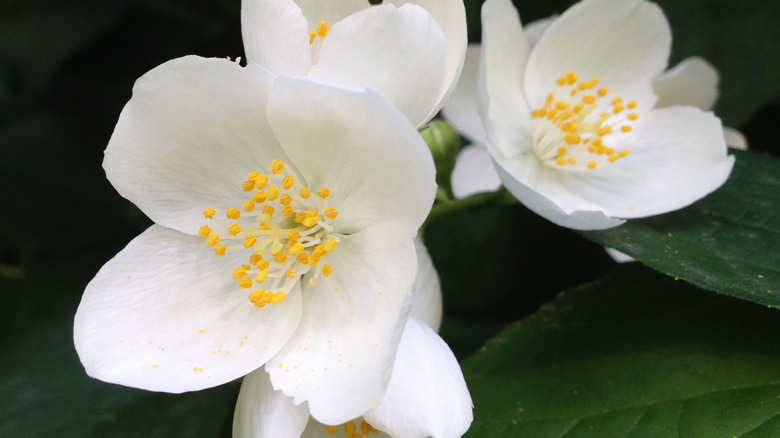
ShadeDesign/Shutterstock
Used in teas, perfumes, and even love spells, the scent of jasmine often precedes the flower. Many jasmine varieties such as star jasmine, night jasmine, and poets jasmine are used around the garden and sometimes in hanging baskets. Jasmine needs six hours of sunlight per day, frequent watering, and fertile loamy soil to thrive and bloom in the spring (via Gilmour). Jasmine plants can be grown in a wide range of USDA zones depending on the cultivar, and each is different, growing from 3 to 20 feet. You should watch container-planted jasmine to avoid it becoming too large.
7. Yesterday, today, and tomorrow
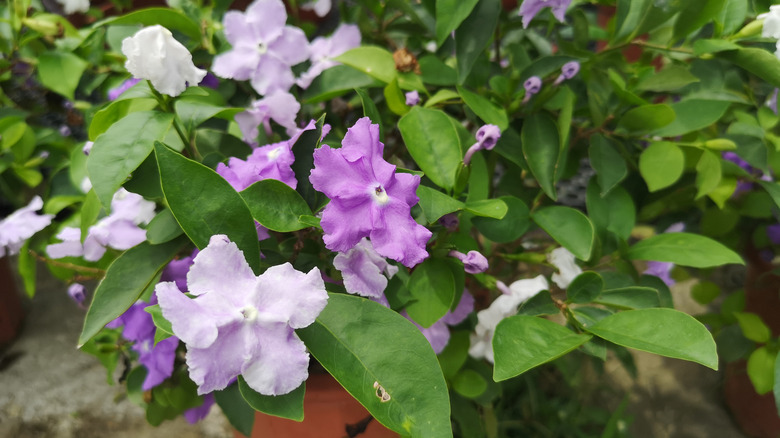
Cheng Wei/Shutterstock
Yesterday, today, and tomorrow (Brunfelsia grandiflora) is an unusual plant with an unusual name; it is named after the fact that its flowers changed color yesterday, today, and tomorrow. The plant’s fragrant blooms appear in the spring and stay for some months, says the University of Florida. Compact varieties are used in hanging baskets in the summer or zones 9 through 11 where they can survive all year long. These plants can grow as large as 10 feet tall outside of a container with partial shade, moderate watering, and well-draining soil.
8. Sweet alyssum
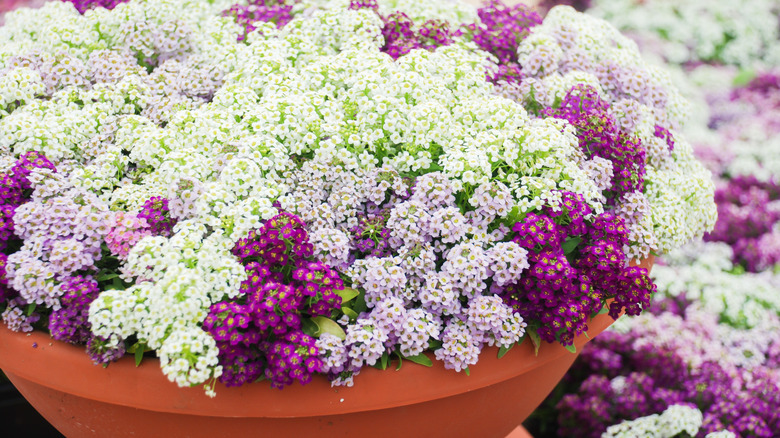
Yui Yuize/Shutterstock
Sweet alyssum plants are compact garden annuals that produce flowers that smell of honey in the spring. The Mediterranean natives only grow to be about 1 foot tall and wide, making them perfect for use in hanging baskets. All they need to survive is at six hours of full sun, deep watering every time the top 2 inches of their soil dries out, and an all-purpose potting mix. They’ll do best in USDA zones 4 through 8 as an annual or 9 through 11 as a perennial, as told by Garden Design.
9. Sweet violet
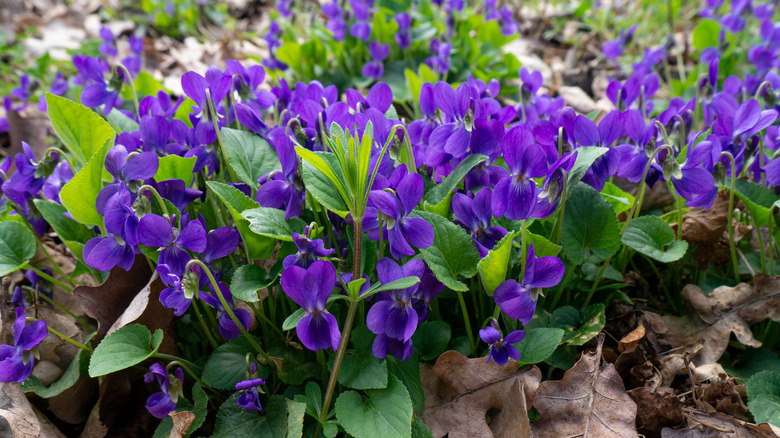
Olexandr Panchenko/Shutterstock
One of the best smelling flowers is the sweet violet, which blooms in the fall. According to The Lost Herbs, this plant has been used to make cosmetics, perfumes, and wine. Sweet violet is an adaptive flora that can grow in many conditions; however, it benefits from receiving partial sunlight, regular watering, and humus-rich soil. USDA zone 6 is perfect for this flower, but it can grow in a variety of climates, including zones 4 through 8. Sweet violets are a wonderful option for baskets because they only grow to be about 1 to 2 feet tall.
10. Scented primrose
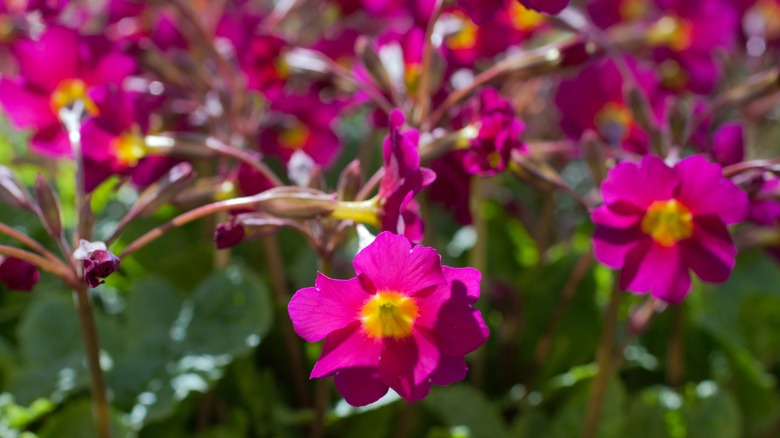
stokerolga/Shutterstock
Some cultivars of primrose smell as beautiful as they look. Easy to grow in containers, this flower needs dappled sunlight, frequent watering, and hummus-rich well-draining soil, as explained by GrowingVale. Primrose flowers look their best when they are grown in USDA zones 4 through 8, where they receive mild weather and some humidity. In adulthood, your scented primrose plant will grow to be only a couple of feet tall and blooms during the winter, spring, or summer.

